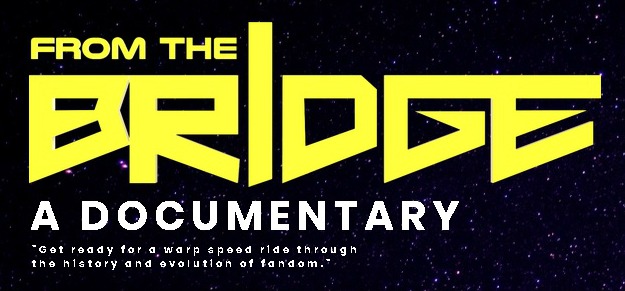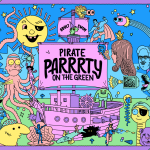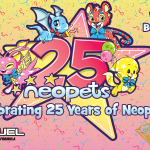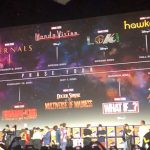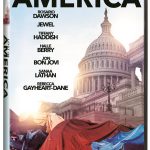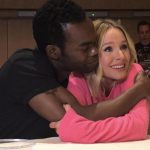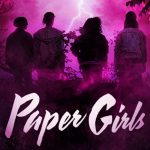We’re All in This Together: An Interview with Spencer F. Lee
San Diego Comic-Con is this week (can you believe it?) and one of the panels we’re most excited about here at The Geekiary is From the Bridge, a documentary about the history and evolution of fandom. From director Spencer F. Lee, From the Bridge is hosted by George Takei and features interviews from such iconic names as Nichelle Nichols, Rod Roddenberry, Todd McFarlane, Neal Adams, and Stan Lee.
Here is the trailer for the upcoming documentary From the Bridge, directed by Spencer F. Lee:
I was fortunate enough to speak with director Spencer F. Lee ahead of his San Diego Comic-Con debut.
THE GEEKIARY: First of all, for people that won’t be that familiar with the documentary. Can you tell be a bit about From the Bridge and what inspired you to make it?
SPENCER F. LEE: From the Bridge is a documentary about the evolution of fandom told from the actual creators, a lot of the creators, of the genres themselves. It is historical in the fact that it talks about how their stories made a positive change on society and humanity and the way that the fans responded to that. A lot of people that are non-fans see fandom and a lot of people who absolutely love these stories, who dress up and go to these conventions, and if they are non-fans, they’re not completely familiar with it. They might not understand what’s really going on.
But what’s going on is that you have these iconic artists and visionaries who created all the way back to DC, Star Wars, Marvel, Star Trek and other series who, number one, had a giant love for humanity, and they told stories of humanity. They told stories of love, stories of loss, betrayal, sacrifice, triumph, and these are the very stories– […] What the fans love is that– yes, they absolutely love the great characters and the costumes and all of that. But if you strip all of that away and you just look at the story, what’s happening is that they are stories about us as people and the lessons. That’s what hooks them. It’s the story. It’s the lessons about celebrating humanity, our diversity and our uniqueness and our cultures, what we look like depending on where we are from the world. And that’s what the artists try to do – take all these things and bridge people together.
From the Bridge was originally the title of Kerry O’Quinn’s monthly column in his magazine Starlog. So, I thought that the perfect title for the movie was From the Bridge. Aside from being those things, I looked at it like, these artists are bridging humanity together. They are bringing us together. What my take on it is, From the Bridge is talking about the bridge that we built to bring the people together.
And I think that’s what fans respond to. They love these stories. They love these cool characters and costumes. It’s just a unique way to tell the story of humanity and who we are, as people from all over the world. And that’s what it’s about. It talks about the history of how it happened – how it went from being really underground and geeky to all of a sudden getting recognition. All of a sudden more people stood up. And as more and more people discover what the stories were about and who these characters were – and who these artists were that created them – it just built a movement.
The movie itself… I document things such as– Neal Adams tells a wonderful story about when he created the first black superhero for DC Comics, which was John Stewart. I have Chadwick Boseman– I also directed the handprint ceremony for Stan Lee at the Chinese Theater – the filming of it – and Chadwick Boseman talks immensely about Stan Lee and the positive impact Stan had by creating the Black Panther character in the ’60s.
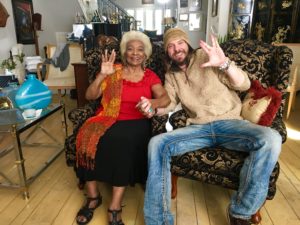
Nichelle Nichols talks a lot about the impact Martin Luther King, Jr., had on her and what her role was as an icon for civil rights. Martin Luther King, Jr., went to her and said, “Hey, you can’t quit Star Trek. You are a role model for black women and children all across the country, because you are the first African-American on television who’s not a secretary or who’s not a servant. You are actually a lieutenant on a starship; you are in a position of power. Please go back. You are doing this wonderful thing for us.”
Aside from those three things I have listed, the movie chronicles that. It talks about how these artists told these amazing stories and created these amazing characters, and they won people over more and more and more. And today it is the number one entertainment in the world, and it’s not just by chance. It’s because the people have responded to these stories, responded to what these artists are trying to accomplish with their stories, and it’s really a beautiful thing. I’m just honored to have been able to sit down with all of these iconic creators and artists and have them talk about their work and why they made the things that they made and what it’s meant for them – the reaction of the fans. And of course, talk with the fans themselves – talking about what these artists meant to them, and what these characters meant to them.
It’s a really wonderful movie about humanity and who we are and what we strive to be, which is basically to be the best we can be, as compassionate and loving we can be to one another.
The Geekiary as a website tries to focus on diversity in media. Most of us are women, most of us are on the LGBT spectrum, so, that’s– actually, the whole bringing humanity together leads us into one of the questions that I had which is… what is your opinion on, as media gets more diverse to try and reflect the world, the backlash that exists in certain corners of the internet, of people who say things like, “Why do you have to make everything gay?” when only one character is gay.
The best answer I have for that is that I believe in bringing people together. I believe in respecting one another for what we are. God made us how we are. We were made by a Divine Creator. So, with that being said, what I like to do myself – whenever I have an opinion about something or I believe strongly about something and it has to do with religion or politics, and there is another side that has a different opinion than I have – is sit down and make a list of ten things that are important to me about this belief I have, or the understanding that I have. Then I try to make a list of ten things on the other side, what’s important to them and why they believe the way they do. And then I look at the ten things on my list, and I look at the ten things on their list, and I try to find common grounds between those two lists.
I try to understand where someone is coming at from their viewpoint, because I already know where I’m coming at, from my viewpoint. I try to reach out and understand the other side of it. Why does someone think this way, if I think that way? Honestly, the truth is that we need both kinds of people. We need all kinds of people. We can’t make the world work with strictly one way. We need each other; we need both sides to make it work. That’s how I look at it. We need to hear everyone. Everyone needs to have a voice, and everyone needs to be heard, and everyone needs to be respected.
As long as what you’re doing isn’t harming someone else or putting someone else in harm’s way, then how bad can it be? If it’s all about love… love is not a bad thing. So, I try to bring people together – the both sides of it – and not try to say that there is only one way. There is usually not one way and there’s usually not– usually not one person has all the answers. We need each other. We need both sides to make it work, and we have to find a way to work together. At the heart of it is respect.
I want to be respected and I want to respect the other side, and I know they want respect. Whenever someone feels disrespected or taken advantage of, or maybe tossed to the side or thrown away, that’s where a lot of animosity starts to build. So, I think it all comes down to understanding and respect. So, I go back to my ten things I believe and I try to create a list of ten things of the opposing opinion […] and I try to come up with common ground between the two. That’s where I start from when I approach an idea.
With superhero films making billions at the box office, why do you think that hasn’t translated into comic book sales?
The big part of it, for me, is that it comes down to accessibility. It’s really easy to go to a movie, sit back, and have something unfold before you. It’s a lot easier to do that than it is to maybe go to a store and buy a comic and then have to catch up to multiple issues of a comic. I think it comes down to accessibility. That being said, I am a big comic book reader. My favorite story right now is Injustice: Gods Among Us Part 2 that DC has come out. Every Tuesday, they release an issue, and usually I am up until 1 o’clock in the morning […] downloading it at 99 cents a week, and I read it straight on my iPhone.
For me, I don’t really buy physical copies of issues much anymore unless I’m giving them away as a gift. I do buy graphic novels to give to friends of mine, if there’s a story that I really enjoyed, that has a great heart to it and a great story about humanity in it. But for myself, I download them digitally and I read them on my cell phone.
And I think it comes back to accessibility, and it comes back to the same thing about novels as well. Before movies and television were really prominent, a lot of people read. That was their way to experience humanity and what we are as people, outside our immediate circle of people. And people learn from that. You learn from experience. You learn from being taught.
So, when you buy a great novel like To Kill A Mockingbird, for example, you learn a lot from that, from the experience of those characters. That’s what the author intended; it was all about humanity. So, to answer your question it really comes down to accessibility and ease.
Generally a lot of people learn, because they were born in the age of television and movies, to sit back and let a story unfold in front of you on the screen versus actually picking up a tangible copy of it and reading it yourself and letting your imagination go in a different way.
I, for one, enjoy reading. It seems like we do have resurgence in it also. People are starting to read a lot more lately than they have in the last couple of decades. Kind of like a resurgence in vinyl records, too. Records, for example, were really popular up until sometime around the 90s […]. People started going back to the yearning of something tangible to hold in their hands and to have, beyond just a digital copy.
So, yes, it is a little bit of that. Accessibility. And I think I have seen a turnaround with that. It seems like people are starting to go back to having tangible things and enjoying nature outside of their internet universe as well.
Have you noticed, in doing this documentary, a shift in demographics of fandoms? Because I have read articles about how more than 50% of convention attendees are women. So, have you noticed a shift of it sort of becoming mainstream?
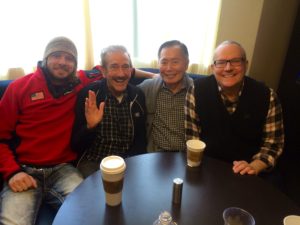
Absolutely! I think that’s just really cool. When I first started collecting comics– as a matter of fact, I was just reminded today by my cousin that the first comic book convention we ever went to together was in 1985, and it was in West Monroe, Louisiana, which is a very small town. And back in 1985 these things, where I’m from, were almost unheard of. And going back to that particular convention, it was probably – I don’t even want to say probably – it was all white males, all white guys. The only women there were like the wives of the guys who were the fans of the comics. And there were probably– there were some female fans there, but it seemed like, in my opinion, they were introduced to it by maybe their husbands or their fathers. And today I see this great explosion of fans, who enjoy these stories, all over the spectrum. Whether they’re black, white, male, female, gay, straight… it seems like now, today, we have something for everyone, that can talk to them and teach stories of humanity to them.
I remember, it was X-Men, when Northstar came out as gay. I remember when that comic issue came out, and it was such… people were so surprised. And I think about other characters – like on Earth 2, the recent book that DC did […] they took Alan Scott, the Green Lantern, and made his character a gay character. He was even in an interracial relationship. He was a white guy whose lover was Asian.
I see this great diversity. I see characters like Ms. Marvel, who is Muslim, from Marvel. I applaud it. I think it’s great. I think it’s realistic. At the same time, I do understand why it took a while for the change to happen, because these artists who made the characters originally were white guys, predominantly. And they were made for white guys. And as time progressed– there’s a lot of that in the film as well. When you talk about creators like Neal Adams, who created the first black superhero – John Stewart, the Green Lantern, for DC. You talk about Stan Lee, Chadwick Boseman has a great speech about this… when Stan first created the first black superhero, Black Panther, for Marvel. In the film there is a great piece with Nichelle Nichols and Martin Luther King, Jr., about how he pulled her aside and said that you can’t quit Star Trek […].
I applaud it. I think From the Bridge is really about building a bridge between people. These stories are stories of humanity. It goes back to me saying you need both kinds of people. You need all kinds of people to make something work. You have to have diversity in thought. You need to have diversity in approach to problem solving. If it wasn’t that way, then we wouldn’t evolve and progress as humanity.
Sort of along that line, what comics or issues do you think have had the most impact on the way comics are written now?
That’s a pretty multi-faceted answer, because I know in the ’90s, it seems like a lot of times – in comics as well as in movies – when something works, you kind of go with it. And when someone creates something in a different way, and that works, then you kind of replicate it and go with it. Maybe that’s the way it works for a lot of things in life, whether it’s car manufacturing or comic books or movies. […] If something works, you kind of go with it.
So, I would say… My answer might sound a little cheesy but probably, I think, looking back, the very first comic book that I ever read that got me involved in reading comics was Amazing Spider-Man. I believe it was issue #256 or #258, I don’t remember which. It’s where he gets his black costume. I was a big fan of Spider-Man. I loved watching Spider-Man and His Amazing Friends. I loved the Spider-Man television show. I was all about Spider-Man.
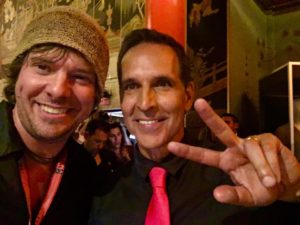
But when all of a sudden, he had a black costume, the idea was so alien to me. I was in 5th grade. I got on the school bus to go home after school, and the boy […] in the seat behind me had the comic book. He was holding it and he goes, “Hey! Spider-Man has a black costume now.” That was at the height of Spider-Man and His Amazing Friends being a giant Saturday morning cartoon. And I went, “What?” and I looked at it. I never really read comic books before. I read that issue, and all of a sudden I noticed, when my mom took me to the local drugstore to pick up things, they had a comic book rack. There were all these comics on the rack. So, all of a sudden I started picking things I wanted to read, and that’s how I became a fan of comics. It was that issue with Spider-Man being in a black costume that was a sea change.
Another sea change was when Jason Todd was killed by the Joker in A Death in the Family. All of a sudden Robin has been murdered by the Joker. All of a sudden comic books were serious in a weird way, because this was Robin. He was a young boy – an iconic character – and was with Batman for decades and decades, and now he had been murdered by a supervillain. It was something alien to the average public. “Hey! In this make believe world of superheroes and supervillains, one of them just actually died.” That was another big, pivotal moment.
And of course, the Death of Superman. That was a giant thing. Superman, the most prestigious superhero of all, all of a sudden he’s dead. It was through sacrifice. He defended humanity. He loved humanity, and now he’s dead, because he sacrificed himself to save humanity. It was a very biblical take on it, in a way.
I think that those three issues were really the beginning of the sea change – the Spider-Man costume, Robin/Jason Todd being killed by the Joker, and the death of Superman at the hands of Doomsday. Those three events in comic books… Of course, we can also talk about Northstar coming out as gay. I remember specifically something that I thought was great about that particular issue. After he proclaims he’s gay in the comic, at the end of the issue he is having a beer with Wolverine in a bar. Just two guys with their mugs full of beer, having a beer together. It was very much a stereotypical guy thing, that you think of, with men. And here you have a gay guy and a straight guy having a beer together in a very bridged together, brotherly love kind of way.
Of course, we have talked about Neal Adams creating John Stewart, Green Lantern. And we have talked about Stan Lee creating the Black Panther. I would say those six issues, I think, were the pivotal issues that created this sea change.
The Geekiary’s thing is that We Are Fans And We Have Feelings! What was your big fandom growing up? What was the defining fandom for you a child? Was it Spider-Man or… ?
Actually, it was Star Wars, and the reason it was… I was only a few years old, and I had never been to a movie in my life, and Star Wars came out. It was obviously a defining moment in our culture and our world, and my mom thought it was time for Spencer to see his first movie. It was at the drive-in theatre in Monroe, Louisiana – rural, northeast Louisiana. I believe we had a Chevette at the time, a little hatchback Chevette, and [my mom] took me to see Star Wars. And I sat there on the seat beside her, and I looked at it on this big screen, and it was a defining moment for me. I changed. And my mom saw that in me. She saw it had a huge impact on me. She began taking me to movies all the time. She began finding programs on television that were similar. Whether it was Lost in Space, whether it was Star Trek, whether Ultraman – these things were all in syndication at the time… All of a sudden, I just became obsessed with these fantastical stories. But it was, as a small child, seeing Star Wars in a drive-in was a defining moment for me.
Same. It was Star Wars for me, too. I think I was 8 or 9. There was one summer where I would get up and watch one of the movies every day during summer vacation. I probably watched each movie 15 times. I’m sure my parents really appreciated that.
I don’t really go to the movies and watch the same movies over and over. But I admittedly watched the new Avengers: Infinity War movie five times. I was so in love with it. I’m not sure if you’ve seen it more than once, but I will say this – the second time I watched it was when I really fell in love with it. I already knew the story, so I wasn’t paying attention to the story. I was able to let loose and look at the nuances and the subtleties surrounding the characters in the story. I really realized what kind of masterpiece that film was. So I loved Infinity War. Great, great movie.
I live in New York City and movies are expensive here. So, I really can only see movies once in the theater, which makes me sad because I used to do it all the time. I grew up in rural Pennsylvania. So, movies were cheap. This is embarrassing but I saw D2: The Mighty Ducks, like, five times in theaters as a kid.
[…]
I only have one more question. You sort have already covered it. What do you hope people get out of From the Bridge?
I hope they leave the film with a unifying message of humanity, and that we’re all in this together, and it takes all kinds of people to make it work. And that people are able to see the other side, and are able to find respect in one another and love in one another again. I really hope it is a unifying message, that we’re all in this together, and we need to love each other and have a higher degree of respect for each other.
—
I’d like to thank Spencer F. Lee again for taking the time to speak with me! We’re all looking forward to the release of From the Bridge later this summer.
For those of you who’ll be attending San Diego Comic-Con this week, you can catch the star-studded From the Bridge panel, moderated by Greg Grunberg and featuring several of the people interviewed in the film, Thursday, July 19, at 10am in Ballroom 20. We’ll see you there!
Author: Jamie Sugah
Jamie has a BA in English with a focus in creative writing from The Ohio State University. She self-published her first novel, The Perils of Long Hair on a Windy Day, which is available through Amazon. She is currently an archivist and lives in New York City with her demon ninja vampire cat. She covers television, books, movies, anime, and conventions in the NYC area.
Help support independent journalism. Subscribe to our Patreon.
Copyright © The Geekiary
Do not copy our content in whole to other websites. If you are reading this anywhere besides TheGeekiary.com, it has been stolen.Read our

